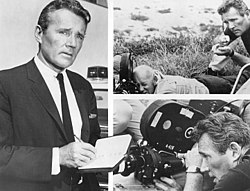| The Felony Squad | |
|---|---|
 Howard Duff working in front of the camera and behind it, 1967. | |
| Genre | Crime drama |
| Created by | Richard Murphy |
| Starring | Howard Duff Dennis Cole Ben Alexander |
| Theme music composer | Pete Rugolo |
| Composers | Pete Rugolo Alexander Courage Robert Drashin Harry Geller Gerald Fried Warren Barker Dean Elliott Jeff Alexander Lyn Murray Shorty Rogers |
| Country of origin | United States |
| Original language | English |
| No. of seasons | 3 |
| No. of episodes | 73 |
| Production | |
| Executive producer | Walter Grauman |
| Producers | Richard Newton (1966–1967) Philip Saltzman (1967–1969) |
| Running time | 30 mins. |
| Production company | 20th Century-Fox Television |
| Original release | |
| Network | ABC |
| Release | September 12, 1966 – January 31, 1969 |
The Felony Squad is a half-hour television crime drama originally broadcast on the ABC network from September 12, 1966, to January 31, 1969. [1]